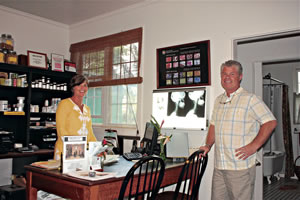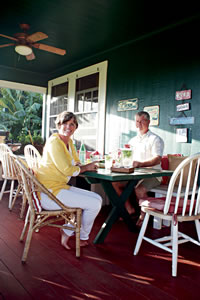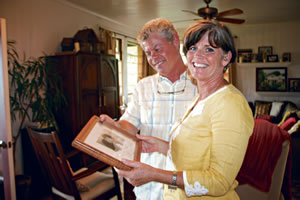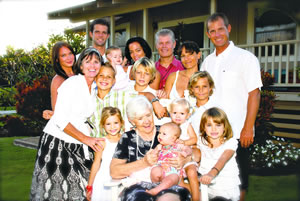Family Man
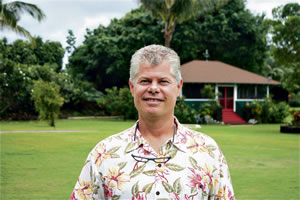
Growing up in a broken home, Dr. Kerry Dillberg's dream from an early age was to establish his own secure family, even proposing to his wife of 38 years, Michele, for the first time at age 12. Today he has that loving family, not to mention a family medical practice that includes emotional wellness
Growing up, Dr. Kerry Dillberg longed for a stable family and created it with wife Michele. Together they also established his family medical practice
Since he was a young child, Dr. Kerry Dillberg has been working toward a sense of wholeness. At the age of 5, he knew he wanted to study medicine. At the age of 7, he wanted to create a family of his own. At the age of 12, he proposed to his wife. Coming from a dysfunctional household – both his parents were alcoholics – Dillberg just wanted some stability in his life.
“I never knew how long I would be at home alone, or if my mom and dad’s fighting would escalate into violence,” he says. “I ended up going to 22 elementary schools. I was constantly moving.” With his mom working full time and going out after work with friends, “my sister did her best to serve as my mom,” he says.
When his parents divorced, Dillberg moved in with an aunt and uncle. It was there that he spent time with a young girl named Michele, who would later prove to be a profound touchstone in his life. Seeking an emotional connection that was not being met elsewhere, Dillberg says that quite simply he was drawn to her.
“I was young, but it was a very stressful time in my life,” Dillberg says. “She was my big anchor in life.”
The first time he proposed everyone thought they were nuts (he was, after all, 12), but that didn’t dissuade him. “For me, I just had this driving desire to start a life of my own and get things going.”
Of course they wouldn’t marry until years later, but being around her already felt like family. Dillberg says Michele’s mother Marian Sullivan was his main maternal figure throughout his life and the matriarch of the Dillberg ohana. She died last year.
“I remember going over to her house and her mom would ask me if I’d eaten, and I’d say no, and she would make me something to eat,” he says. “I thought it was the coolest thing ever. I think of her far more as a mother than my real mother was.”
Now, after having been married 38 years, Dillberg has created exactly what he dreamed of when he was just a boy: a family to call his own with three children and eight grandchildren, and a family practice to boot. The practice, Dillberg Integrated Healthcare, is based in Po’ipu on the same property on which he built homes for his family and subsequent families.
It’s there that he offers a holistic, non-western approach to healing that includes traditional Chinese medicine, neuro-emotional techniques for stress reduction, nutritional therapy and postural work.
Having come from a childhood in which he yearned for a sense of completeness, it’s not surprising that his approach to health incorporates emotional well-being.
“Kerry’s philosophy is that nothing in the body occurs in a vacuum,” says Michele, who works with her husband as an office coordinator and lifestyle education counselor. “Every system, every organ, every cell contributes – and sometimes needs to compensate – to create home-ostasis or balance.”
That’s why taking care of yourself means having an understanding of what you need, versus what you want.
“Often we do the opposite of what we need. When we are stressed we commonly take short, shallow breaths, but what we need is deep, cleansing breaths to release the stress,” she says. “When we are feeling low energy we gravitate toward junky, sugary foods, which will make us feel worse. … When a craving or tendency crops up, ask yourself ‘Is it what I need, or just a bad habit?'”
Nutrition is just a small piece of integrated health care, she adds, noting there are several factors that make up “the healthcare puzzle.”
Dr. Dillberg, who has treated children with ADHD and compulsive disorders as well as renowned athletes such as surfer Bethany Hamilton, Olympians Marion Jones and Sherri Howard, and pro football players Otis McKinney and Fran Tarkenton, considers more than the regular gamut of factors when treating patients. Looking for toxicity in blood, along with parasites, yeast, mold or fungus, as well as neuro-emotional techniques, also are part of the mix.The latter, which he defines simply as “the crux of what patients think about or feel,” looks at how stored memory patterns affect the nervous system.
“(It’s) a specific procedure to see how their brain responds to negative stored memory patterns,” he says. “Basically, you help them find the good in any situation.”
Though keeping emotional stress levels to a minimum is one way in which everyone can become healthier, it’s easier said than done to tell someone to “think positively.”
“The truth is we all have a free choice in how we choose to respond to these stresses when they occur,” he says. “Everyone has stress in their life, but we have a free choice of loving, caring, forgiving, accepting and being tolerant, or choosing to be fearful, angry, covetous, worried and doubtful.”
Though it might seem hard to retrain oneself, from a holistic standpoint, Dillberg says it gets easier as re-patterning thoughts has a cumulative, positive effect.
If health isn’t enough reason to forgo negative thinking, perhaps vanity is.
“We can rapidly age ourselves or find the good in the situation,” he says.
Keeping the body more alkaline than acidic can include eating alkalizing foods such as fruits and vegetables, Dillberg says that whenever people choose to think positively, “there is a flood of alkaline material to the brain, the greatest pharmacist ever discovered.”
Primary stress hormones cortisol and adrenaline, which are vital but acidic, can exhaust the immune system and cause people to “prematurely age, rot and decay,” he adds.
As for how he and his wife keep their love strong and their health vibrant, the two love to go on hikes, as that’s when they make time talk to each other.
“It’s what allows us to connect with each other, when everything else might seem busy or distracting,” Michele concludes.

